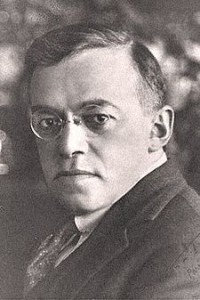The audience sat silently, the men’s heads tilted against their starched collars, the women’s faces nestled in luxurious fur. A skinny man with round spectacles stood before them, lecturing in Yiddish. He told them to leave their homes, to leave their prosperous lives, and move to Eretz Israel. He looked them in the eyes and told them, “Eliminate the Diaspora, or the Diaspora will surely eliminate you.” After he had concluded his speech, the men and women returned to their homes. A few took his advice, but most of those stoic faces were content to listen and to stay put.
That man was Ze’ev Jabotinsky, and the year was 1934. The audience was composed of French Jews. We know these things because the lecture was filmed as part of Jabotinsky’s campaign to spread his message to the assimilated Jewish communities of Europe. Jabotinsky is my hero because he spread a true yet unpopular message in an attempt to save the lives of his fellow Jews. He was a visionary and a great Jewish leader, and his theoretical work has helped to form modern Jewish thought.
Unfortunately, he was also a failure. It is impossible to watch the short film of his speech without feeling horror at the thought that many of the men and women in the audience would not survive the next eleven years. I look at my grandfather’s picture on my wall; his starched collar, parted hair, and glasses make him indistinguishable from the men in the audience. In 1934, he was in his twenties, and had recently arrived in America. His father, an old man by then, had chosen to remain in Hungary with some of his siblings. Before the Second World War, they were all religious or socialist or both. They were idealists, like me. I can picture my great-grandfather listening to Jabotinsky’s ravings. As a Jew, he liked to expose himself to different perspectives. This week, it was a Zionist. Next week, a socialist. A Hasidim might be stretching it. That aside, he had no reason to believe what the man said. His Hungarian neighbors still patronized his bakery, and the Jewish school across from his home was still open. He didn’t listen. He died.
It is easy to understand why Jabotinsky failed: all you have to do is look around at the pathetic homage our countrymen, particularly college students, pay to ideological diversity. They attend lectures by socialists, they argue with capitalists, and they even listen as their cleaning lady talks about why she supports Donald Trump. They do all this, but at the end of the day, they retreat to their safe spaces and complain that the socialist was too radical, that the capitalist was immoral, and that the cleaning lady was racist. They fear every perspective that challenges their conception of reality, and they actively avoid things that provoke self-reflection.
It is a far greater challenge to divine a plan of action by which Jabotinsky could have succeeded. Can one man, equipped with the truth, really infiltrate the minds of a people who are so resistant to new ideas? The answer is obvious: Jabotinsky was doomed to failure. No matter what he said, logic, passion, and evidence were all inadequate to convince those Parisian Jews that their lives were in danger. Only one thing could have convinced them, and that thing could not come from an external source.
If they had possessed the courage to leave their synagogues, their community halls, and their schools, they would have heard the truth in so blatant a fashion that it would have overwhelmed them. If they had gone to Hitler’s rallies, listened to his speeches, and talked with his supporters, they would have realized the real danger they were in. There is even a chance – albeit slight – if they had started early enough, that they could have stopped the nightmare before it spread over all of Europe.
Hate often stems from ignorance, from a divide between two parties characterized not by conflict but by an absence of contact. By engaging with those who hated them, the Jews of Europe could have undermined their hatred. At the very least, they could have seen it for what it was and left before it was too late. I am not lamenting conflict: I am lamenting its loss. Students who avoid engaging with Trump supporters fear conflict when they should welcome it.
I came to this conclusion and wrote much of this editorial before our recent Presidential election, but I feel that it is necessary to clarify how this extended analogy applies to our present situation. Donald Trump is not Hitler, and Trump’s supporters are not the Germans who eagerly followed Hitler. The real “Hitler” in this analogy is the growing cultural division in the United States, and the “eager Germans” are those partisans on both sides who blindly call for ideological homogeneity. In my last editorial, I called for “extreme” dedication to a cause. That stands: the answer is not to abandon principle for moderation, it is simply to listen to other principles. Conflicting passions are the building blocks of a free society; the loss of passion and the loss of conflict are both to be avoided at all costs.


Terrific column.
Remember that the original brown and black shirts of Hitler’s SA and Mussolini’s fascists, were ex-soldiers, veterans of WW1, many of them special assault troops,Italian Arditiand German Stormtroops, both a species of special forces, who, for some reason, liked being in their armies-even if they were doing their damnedest to get them all killed! But they admired their general’s ability to set great projects on foot by decisive decision-,taking and therefore looked to the “Fyoorar Prinzip”to get necessary things done which their establishments refused to even consider!We haven’t created enough angry and betrayed veterans to reproduce the conditions which made the SA, Blackshirts and English BUFFs possible-but Obama was working on it!